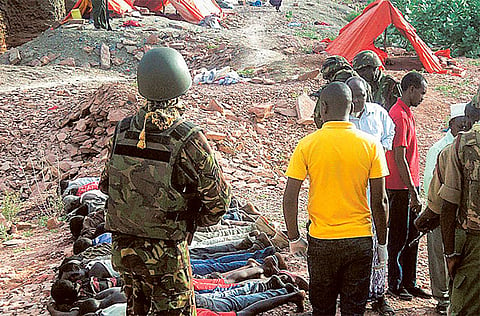Somalia’s Al Shabab claim latest Kenya massacre, vow more attacks
Gunmen massacred 36 people in the troubled region

Mogadishu: Somalia’s Al Shabab rebels on Tuesday said they carried out the massacre of 36 quarry workers in northeast Kenya, and vowed to be “uncompromising, relentless and ruthless” in fighting Kenya.
“In another successful operation carried out by the Mujahideen, nearly 40 Kenyan crusaders met their demise after a unit from the Saleh Nabhan brigade raided them in the midnight hours of Monday at Koromei, on the outskirts of Mandera,” Al Shabab spokesman Shaikh Ali Mohammad Rage said in statement.
Gunmen massacred 36 people in northeast Kenya in the troubled region, officials said on Tuesday.
A group of gunmen attacked a quarry near the town of Mandera in the early hours of Tuesday morning. After spraying tents where the quarry workers slept with gunfire, the militants then weeded out non-Muslims and shot them in the head. Some of the victims were also beheaded, police sources and reports said.
The attack comes just over a week after the Al Shabab claimed responsibility for the execution of 28 people who were grabbed from a bus travelling from Mandera, a border town located on the frontier between Kenya, Somalia and Ethiopia.
In a separate attack late Monday in the town of Wajir, also in the northeast and close to the dangerous border with war-torn Somalia, one person was killed and 12 wounded when gunmen hurled grenades and fired into a bar.
“We have lost 36 people, but there are others missing,” said a local police official Mandera, who asked not to be named. “We don’t know whether they were taken by the attackers.”
Police spokesman Zipporah Mboroki confirmed the attacks but said the force would provide an exact toll of those killed later. Media reports said most of the victims were laid out on the ground and shot in the head, a style of killing used in the recent attack on bus passengers.
Kenya has suffered a series of attacks since invading Somalia in 2011 to attack the Al Shabab, and its troops are still in Somalia as part of an African Union force battling the Islamists.
Media reports from Somalia said the Al Shabab’s radio station has hailed the killing of “crusaders”, although there has not yet been formal claim of responsibility from the militants.
The group said it carried out the recent attack against the bus passengers in retaliation for Kenyan police raids against suspected radical mosques in Kenya’s port city of Mombasa, the scene of mounting religious tensions.
Professionals working in the largely Muslim and ethnic Somali northeastern regions often come from further south in Kenya, where Christians make up about 80 per cent of the population. Those working in the quarry attacked on Tuesday were also reported to have been from outside the region.
Several key unions including for civil servants have warned their members to leave the restive northeast until the government can ensure their safety.
On Sunday the Nation newspaper reported that Kenya’s embattled interior minister and police chief may soon be sacked over “repeated lapses” in security.
The newspaper said key advisers to President Uhuru Kenyatta were pushing for Interior Cabinet Secretary Joseph Ole Lenku and Inspector-General of Police David Kimaiyo to go, due to dwindling public confidence in the country’s security apparatus.
It said intelligence officials had alerted police to the presence of a group of Al Shabab attackers in the northeast before the bus attack, and added that survivors had said that police “took two hours to respond to distress calls” after the murders had taken place — leaving the attackers plenty of time to escape.
Both officials have been under fire since last year’s attack by the Al Shabab against the Westgate shopping mall in Nairobi, in which at least 67 people were killed in a siege involving just four gunmen and which lasted four days.
Worries over internal security mounted when Al Shabab rebels massacred 100 people in a string of Al Shabab raids against villages in the Lamu region on the Kenyan coast in June and July.
Al Shabab leader Ahmad Abdi Godane was killed in a US air strike in September. The group has since named Ahmad Umar, also known as Abu Obaidah, as its new head.


![The incident occurred in the early hours of Tuesday in Kampani Zurak community, located in the Wase area of Plateau state. [Illustrative image]](http://media.assettype.com/gulfnews%2Fimport%2F2022%2F12%2F13%2FSTOCK-ambulance_1850a298a2c_large.jpg?w=320&auto=format%2Ccompress&fit=max)
